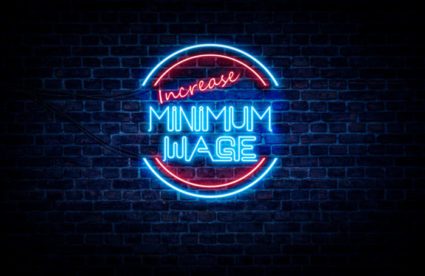 Knowing how polarized we have become as a nation I usually make a concerted effort to avoid overtly political issues in my columns. But, as an unapologetic capitalist I felt the need to comment on the recent congressional approval of a $15 federal minimum wage and its potential economic impact.
Knowing how polarized we have become as a nation I usually make a concerted effort to avoid overtly political issues in my columns. But, as an unapologetic capitalist I felt the need to comment on the recent congressional approval of a $15 federal minimum wage and its potential economic impact.
Realistically, the passage of this increase was done more as a political strategy than an economic one. House Democrats know it has no chance of becoming law as long as Republicans still control both the Senate and the White House. (Which is why no such proposal was made when President Obama was in office)
When I discuss the matter with those who support a $15 minimum wage I always ask why stop at $15, why not make it $50? Wouldn’t that be even more compassionate? Most people usually reply that an increase of that size would kill jobs, lead to price increases, or simply be too much to pay for unskilled labor. I would argue that same logic is equally valid for a $15 minimum wage, particularly in places like the Midwest where the cost of living is significantly less than on the coasts.
As best as I can, I want to cast aside the political ideology and look at the issue of the minimum wage empirically. Using statistical data, I hope to show why such an increase does harm to the majority of Americans including many that it’s intended to help.
A recent study by the Congressional Budget Office entitled “The Effects of Employment and Family Income of Increasing the Minimum Wage” concluded that if a $15 national minimum wage were enacted some low wage workers would indeed see an increase in earnings, but many would also experience the reduction or even elimination of employment as a result of job consolidation and automation.
Similarly, a recent study by the University of Washington was done in Seattle where the minimum wage was increased from $9.47 to $15.45. It found that wages of low income workers increased by $10 per week, but also resulted in a reduction of the total number of hours individuals were allowed to work. This study also warned that because Seattle has experienced an unprecedented economic boom over the past 5 years the negative consequences of this high minimum wage during an economic downturn is still unknown.
In what can only be described as hilariously ironic, Presidential nominee and socialist, Bernie Sanders, made headlines this past weekend by pledging to pay all of his staffers a minimum of $15/hr after being criticized for paying campaign employees low wages. Shortly after publicly making this announcement however, campaign employees were told to expect a decrease in the number of hours they would be permitted to work to offset these increased costs.
Personally, as a strong supporter of the father of modern economics Adam Smith, I believe the way to increase wages is not through government mandates and artificial minimums, but instead through the natural laws of supply and demand. Over the past few years in the US we have experienced a significant increase in average hourly wages.
According to the Department of Labor, median weekly earnings were 3.7% higher in the second quarter of 2019 when compared to 2018. That number becomes even larger the more education and training that the individual has. The reason for this increase is simple. As demand increases for skilled workers and the supply is reduced by low unemployment business owners are forced through natural competition to pay higher wages.
In the end, there are many that will try to convince you in the name of fairness and compassion that we should make our minimum wage a living wage. But, if the pay structure proposed isn’t justified through sound economic principles the harm it does could be far worse that it’s intended benefit.
